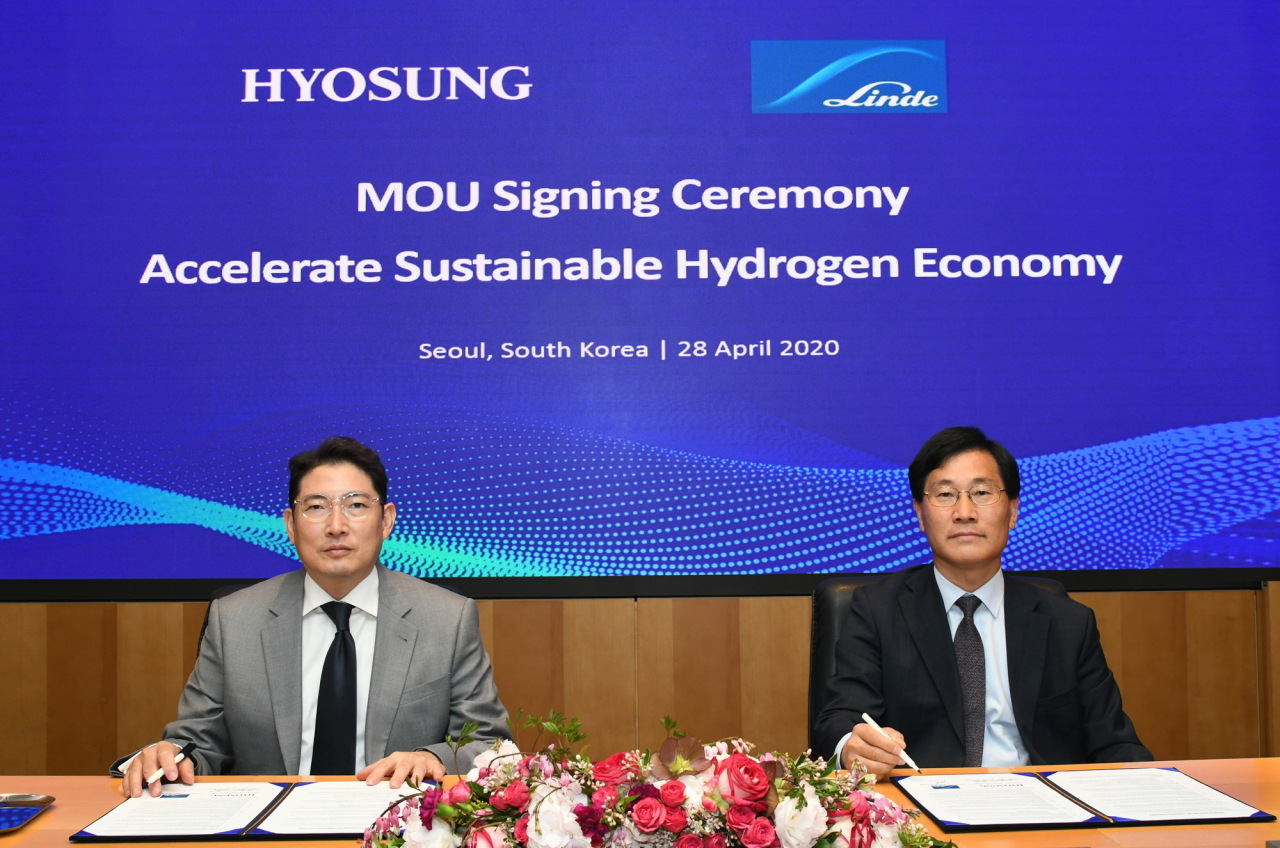 |
Hyosung Group Chairman Cho Hyun-joon (left) and Linde Korea Chairman Sung Baek-seok sign a memorandum of understanding on building a liquid hydrogen plant at Hyosung Group headquarters in Seoul on Tuesday. (Hyosung Group) |
South Korean textile and chemical conglomerate Hyosung Group announced Tuesday its plan to build the world’s largest liquid hydrogen plant in Ulsan in cooperation with global chemical company Linde.
Hyosung Group’s Chairman Cho Hyun-joon and Linde Korea’s Sung Baek-seok signed a memorandum Tuesday, agreeing to invest 300 billion won ($244 million) until 2022, to establish a comprehensive value chain for liquid hydrogen production, delivery and facility operation.
The two companies agreed to construct the new liquid hydrogen plant on a 30,000-square-meter area inside Hyosung Chemical’s Yongyeon Plant in Ulsan. The envisioned plant is expected to produce 13,000 metric tons of liquid hydrogen per year, enough to power 100,000 cars, the company said.
For the plant construction, Hyosung and Linde, which is based on Germany, will establish a joint corporation within this year and embark on the work in the first quarter of 2021, the company said.
“Hydrogen is an environment-friendly energy source with endless potential, that can change the carbon-centered economic structure,” Cho said. “The core of our liquid hydrogen business is to enable storing and delivering of hydrogen efficiently and safely. I believe the investment will play a role in activating the domestic hydrogen industry.”
Linde’s Sung said their cooperation with Hyosung will create “synergy.”
“Linde Group has been producing and using liquid hydrogen in the US and Europe for the past 30 years, and we are developing various applications that can be used in the mobility sector,” Sung said.
The hydrogen produced as a byproduct from the Yongyeon Plant will be reprocessed as liquid hydrogen with Linde’s technology and facilities. The final product would be possible to use in electric cars but also in drones, ships and trucks, Hyosung said.
The company said it will also come up with charging infrastructure for liquid hydrogen around the time of the completion of the construction 2022. It plans to build 50 new hydrogen charging stations and expand the 70 existing ones.
Hyosung Group’s affiliate Hyosung Heavy Industries has been in the compressed natural gas charging system business since 2000. The company started building hydrogen stations in 2008, and is currently leading the industry in Korea, with a 40 percent market share, Hyosung Group said.
By Jo He-rim (
herim@heraldcorp.com)





![[KH Explains] For Korean automakers, Chinese EVs may loom larger than Trump’s tariffs](http://res.heraldm.com/phpwas/restmb_idxmake.php?idx=644&simg=/content/image/2024/11/14/20241114050537_0.jpg)
![[Graphic News] Tainan predicted top destination for South Koreans in 2025](http://res.heraldm.com/phpwas/restmb_idxmake.php?idx=644&simg=/content/image/2024/11/13/20241113050807_0.gif)

